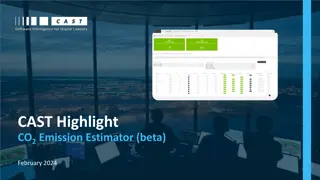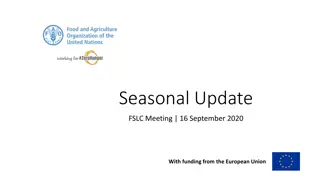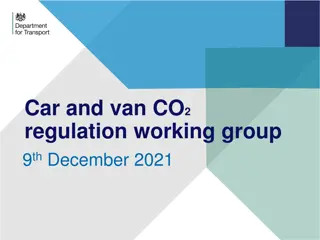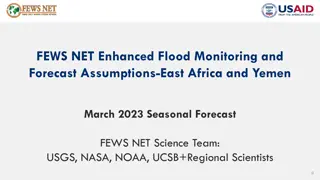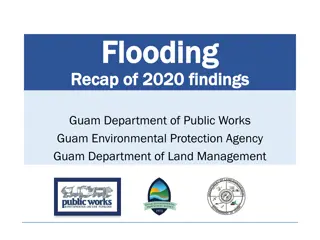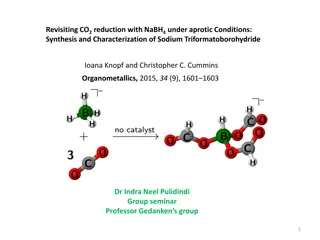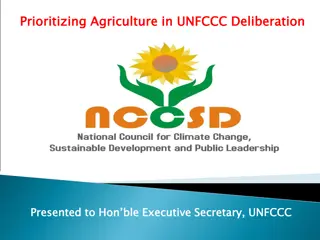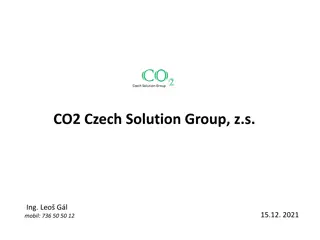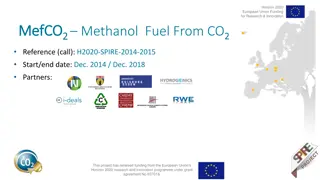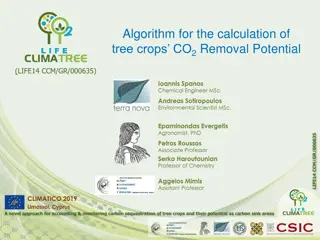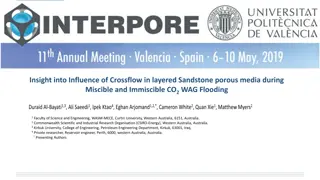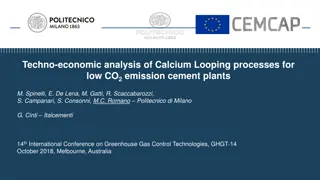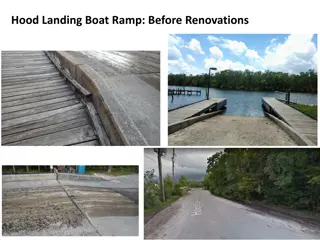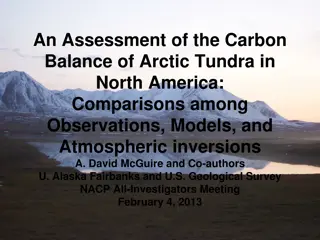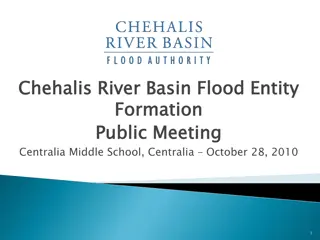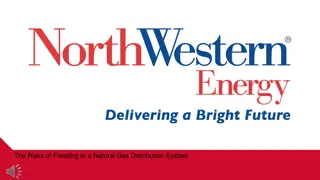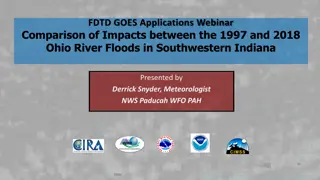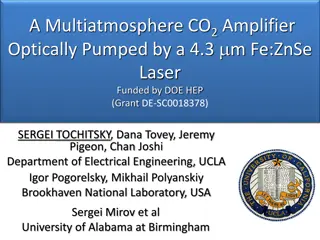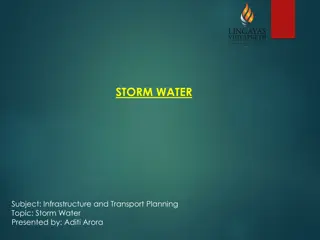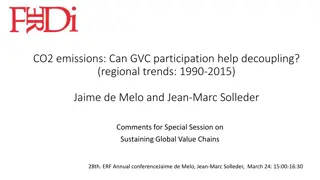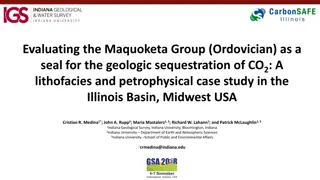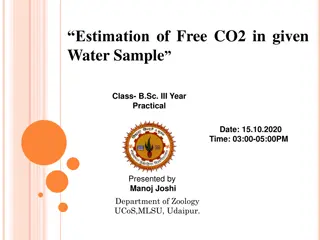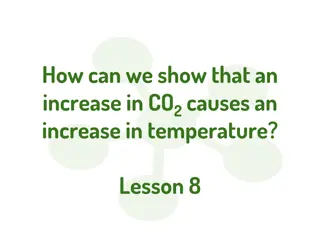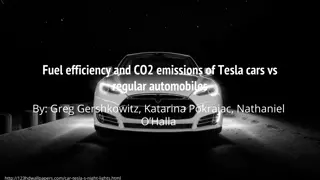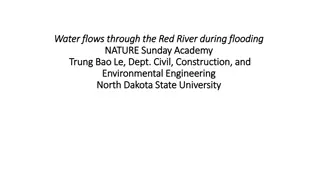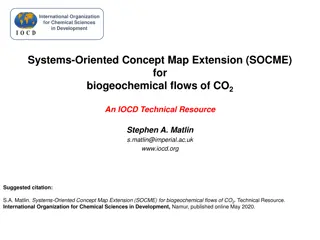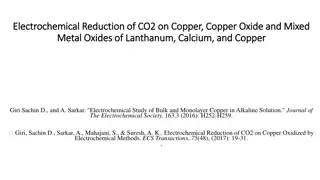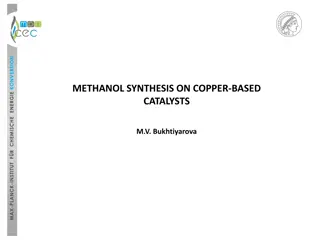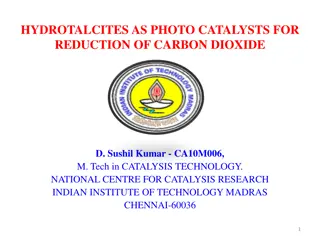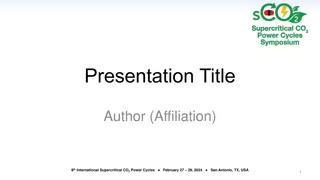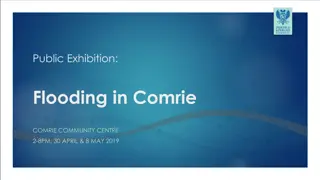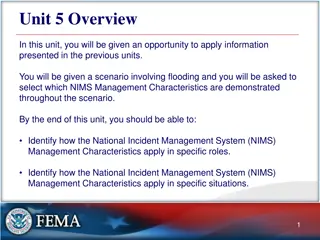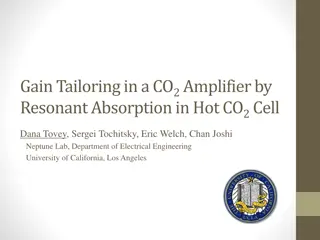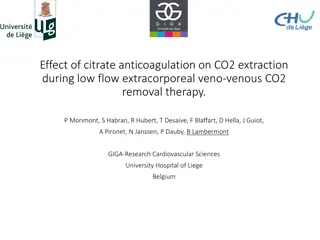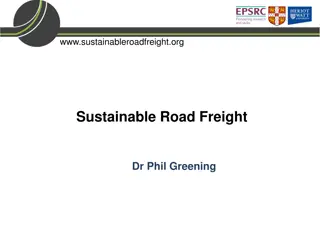Understanding Climate Change: Insights from Reed B. Haslam, NYSC Delegate 1972
Reed B. Haslam, an experienced atmospheric scientist, reflects on his early weather observations, noticing the impact of climate change through warming temperatures and reduced precipitation. He emphasizes the key contributors to global warming, such as deforestation and carbon dioxide emissions. Co
1 views • 54 slides
Developing the CAST Highlight CO2 Emission Estimator (Beta) - February 2024
CAST Research Labs studied the impact of removing green deficiencies detected by CAST Highlight on CO2 emissions and energy consumption in custom software applications. The study led to a formula for estimating potential CO2 emission reductions, which was integrated into the new CAST Highlight CO2 E
0 views • 11 slides
Seasonal Update and Forecast: Weather Trends and Recommendations for September 2020
Seasonal update highlights wettest months with flooding, GHACOF forecast for drier conditions, and current rainfall patterns. Key risks include continued flooding effects with recommendations for humanitarian support and livestock health services. FAO's flood impact analysis and FSNMS survey to prov
0 views • 8 slides
Overview of Car and Van CO2 Regulation Working Group Meeting, 9th December 2021
The Car and Van CO2 Regulation Working Group convened on 9th December 2021 to discuss recent and upcoming legislative changes impacting CO2 emission regulations for vehicles. The meeting included agenda items such as collecting on-board fuel consumption monitoring data, manufacturer requirements for
0 views • 28 slides
Seasonal Flood Monitoring and Forecast in East Africa and Yemen (March 2023)
Enhanced flood monitoring and forecast assumptions for East Africa and Yemen for the season of March 2023, including specific details on flooding conditions in South Sudan, streamflow forecasts for the Blue Nile, Victoria Nile, Rwanda, Burundi, and Yemen. The analysis also predicts seasonal flooding
0 views • 6 slides
Addressing Flooding Issues in Guam: 2020 Findings and Recommendations
Detailed findings from Guam's public agencies highlight major gaps in addressing flooding, such as lacking subdivision drainage requirements, minimal development standards for homeowners, and insufficient post-construction problem mitigation. Recommendations include density restrictions, low impact
0 views • 11 slides
Sodium Triformatoborohydride Formation via NaBH4-CO2 Reaction
Sodium triformatoborohydride, Na[HB(OCHO)3], is synthesized by reacting NaBH4 with CO2 under aprotic conditions. The choice of reductant is crucial for CO2 reduction methods, highlighting the role of NaBH4 as a cost-effective and reactive reducing agent for formate production. The exclusive formatio
1 views • 12 slides
Enhancing CO2 Absorption Through Prioritizing Agriculture in UNFCCC Deliberation
COP 24 aims to address the challenges of global warming but faces obstacles in reducing CO2/GHG emissions. Emphasizing agriculture as a key solution due to its CO2 absorption capabilities can lead to breakthroughs. Implementing measures like modern technology in agriculture and promoting initiatives
1 views • 12 slides
CO2 Czech Solution Group: Advancing Industrial Carbon Capture and Utilization
The .CO2 Czech Solution Group, led by Ing. Leo G.l.mobil, is focused on CO2 capture and utilization from industrial processes. They prioritize BioCCS, CCU technologies, and aim to establish expert groups, engage in international cooperation for a low-carbon economy, and create a cooperative environm
1 views • 17 slides
Horizon 2020 MefCO2 Methanol Fuel From CO2 Project Sustainability Impacts
The Horizon 2020 MefCO2 project focuses on producing methanol fuel from CO2, aiming to reduce CO2 emissions significantly and achieve renewable energy goals. The project aims to displace fossil fuels with green chemicals and advanced fuel production, providing solutions for energy storage and grid s
1 views • 6 slides
Algorithm for Tree Crops CO2 Removal Potential
Algorithm for the Calculation of Tree Crops CO2 Removal Potential (LIFE14.CCM/GR/000635) focuses on efficiently determining the capacity of tree crops to remove CO2 from the atmosphere. This algorithm considers various factors such as the biological cycle of the tree, cultivation practices, and carb
1 views • 17 slides
International Workshop on Offshore CO2 Storage: Goals, Expectations, Logistics
The International Workshop held in Texas aimed to foster collaboration and knowledge sharing on offshore CO2 storage. Topics included understanding requirements, sharing best practices, and identifying challenges and opportunities for offshore storage. The event highlighted the global potential for
1 views • 18 slides
Influence of Crossflow in Layered Sandstone Porous Media During CO2 WAG Flooding
Reservoir heterogeneity significantly impacts oil recovery processes and flood conformance. Research findings show that Miscible WAG outperforms Immiscible WAG, with crossflow affecting sweep efficiency. Increased permeability ratio leads to channelling of CO2, affecting oil saturations and recovery
1 views • 4 slides
Techno-Economic Analysis of Calcium Looping Processes for Low CO2 Emission Cement Plants
This study explores the application of Calcium Looping (CaL) processes in cement plants to reduce CO2 emissions. The process involves using CaO as a sorbent to capture CO2 from flue gas, with the potential for integration at different points in the cement production process. The Tail-end CaL configu
3 views • 14 slides
Hood Landing Boat Ramp: Renovations and High Tide Flooding
Explore the transformation of Hood Landing Boat Ramp from its pre-renovation state to its upgraded version after the 2018 summer renovations. Witness the improvements made to stabilize shoulders, replace dock components, repair the ramp, and add lights. Discover the challenges faced during high tide
0 views • 4 slides
Insights from CO2 Measurement in Classroom Ventilation
Understand the significance of CO2 measurements in classroom ventilation for better indoor air quality and reduced infection risks. Explore the use of CO2 sensors, data analysis, and proxy models to improve ventilation systems in schools. Discover findings on airborne infection risk and variations w
2 views • 9 slides
Carbon Balance of Arctic Tundra in North America: An Overview
This assessment delves into the carbon balance of Arctic tundra in North America, comparing observations, models, and atmospheric inversions. Co-authored by researchers from various institutions, the study analyzes data from 1960 onwards, addressing the changing CO2 sink in high latitudes. It evalua
0 views • 17 slides
Addressing Flooding Issues in Chehalis River Basin: Formation of Flood District
Formation of a multi-county flood district in the Chehalis River Basin to combat repeated major flooding events, which have caused significant damages and disruptions over the years. The establishment of the Flood Authority as a temporary entity to address flood issues and the steps taken to mitigat
0 views • 24 slides
Louisiana Coastal Flooding Litigation Overview
The content discusses various aspects related to the Katrina Canal breaches consolidated litigation in Louisiana, focusing on the legal implications, failures in flood control measures, geology of coastal Louisiana, coastal elevations, and the impact of canal breaches on flooding in the region. It a
1 views • 30 slides
Managing Risks of Flooding in Natural Gas Distribution Systems
Understanding the risks posed by flooding to natural gas distribution systems is crucial for effective planning, risk assessment, and emergency preparation. Water intrusion, submergence of gas meters, dislocation of distribution mains, and damage to facilities are potential consequences. Infiltratio
0 views • 22 slides
Comparative Analysis of 1997 and 2018 Ohio River Floods in Indiana
Rounds of heavy rainfall in 2018 and 1997 resulted in significant flooding along the Ohio River in southwestern Indiana and northwestern Kentucky. While the crests were similar, the 2018 flood had more severe impacts in certain areas, leading to flash flooding, road inundation, and crop damage. The
0 views • 23 slides
Multiatmosphere CO2 Laser Amplification Funded by Department of Energy
A project funded by DOE HEP focuses on developing a multiatmosphere CO2 amplifier optically pumped by a 4.3m Fe:ZnSe laser. The motivation lies in exploring the potential of optically pumped CO2 lasers for generating picosecond pulses at a high repetition rate. The project involves a collaboration b
0 views • 11 slides
CO2-Laser-Driven Dielectric Laser Accelerator Proposal
Study and experimental demonstration of a CO2-laser-driven dielectric laser accelerator, addressing the limitations of current accelerator technologies by utilizing longer laser wavelengths for increased charge and improved beam control. The proposal aims to develop a novel in-vacuo scheme for ultra
0 views • 13 slides
Managing Stormwater in Infrastructure & Transport Planning: A Comprehensive Overview
Stormwater management is crucial for urban areas like Delhi due to heavy rainfall patterns and the risk of flooding. Factors influencing rainfall, runoff estimation methods, and water stagnation points are discussed. The importance of natural drainage systems in mitigating flooding is emphasized.
0 views • 5 slides
CO2 Emissions and Global Value Chains: Trends in Decoupling and Regional Impacts
The discussion focuses on the relationship between CO2 emissions and Global Value Chains (GVCs) from 1990 to 2015, exploring how GVC participation can aid in decoupling. It covers the environmental implications of GVCs, such as the effects on CO2 footprints, trade patterns, and emission intensities
0 views • 19 slides
Evaluating Maquoketa Group for CO2 Sequestration in Illinois Basin
Study examines the Ordovician Maquoketa Group's potential as a seal for CO2 geologic sequestration in the Illinois Basin. The project background, methodology, results, and conclusions highlight the importance of the CarbonSAFE Initiative in developing storage sites for carbon dioxide from industrial
0 views • 20 slides
Estimation of Free CO2 in Water Sample for B.Sc. III Year Practical
The practical session focuses on estimating free CO2 in a water sample using titration methods with NaOH and Na2CO3. Students learn the process of converting carbonic acid to neutral sodium bicarbonate to determine the presence of free CO2. Procedures, reagents, observations, and calculations are de
0 views • 6 slides
Exploring the Relationship Between CO2 and Temperature Increase
This lesson guides students through an investigation to show the correlation between CO2 levels and rising temperatures. The students design a model using water bottles, thermometers, and Alka-Seltzer to test if CO2 can cause a temperature increase. They analyze data and draw conclusions to understa
0 views • 9 slides
Comparing Fuel Efficiency and CO2 Emissions of Tesla Cars and Regular Automobiles
Explore the fuel efficiency and CO2 emissions of Tesla cars versus regular automobiles through the innovative technology of electric motors. Tesla cars boast equivalent fuel efficiency of 87 miles per gallon, up to 265 miles on a single battery charge, and significantly lower CO2 emissions. The elec
0 views • 9 slides
Understanding Riverine Systems and Flooding: Core Concepts and Activities
Delve into the concepts of riverine systems and flooding with a focus on tributaries, snowpack, watershed, flow discharge, and more. Engage in interactive activities like word games and brain teasers to enhance your learning experience.
0 views • 4 slides
Systems-Oriented Concept Map Extension for Biogeochemical Flows of CO2
The Systems-Oriented Concept Map Extension (SOCME) explores the biogeochemical flows of CO2, detailing interactions within the ocean and land subsystems, including factors such as uptake by different biomes, anthropogenic CO2 generation, deforestation effects, and energy production contributions. It
0 views • 6 slides
Electrochemical Reduction of CO2 on Copper and Mixed Metal Oxides
Different methods for CO2 reduction have been studied, with electrochemical reduction showing promise due to its use of electricity from nonconventional sources. Research on copper's unique characteristics for producing various CO2 reduction products has led to investigations into optimizing activit
0 views • 30 slides
Methanol Synthesis on Copper-Based Catalysts at Max Planck Institut
Methanol production using synthesis gas, studying CO2 hydrogenation for reduced CO2 emissions, and utilizing methanol as a hydrogen storage method are key areas of focus at the Max Planck Institut for Chemical Energy Conversion. The process involves methanol synthesis from CO2 and H2, with experimen
0 views • 19 slides
Utilizing Hydrotalcites as Photo Catalysts for Carbon Dioxide Reduction
Burning fossil fuels leads to CO2 emissions, posing a significant environmental challenge. Converting CO2 into valuable hydrocarbons through photocatalytic reduction using solar energy provides a sustainable solution. This process involves multi-electron transfer steps, requiring efficient catalysts
0 views • 24 slides
8th International Supercritical CO2 Power Cycles Conference in San Antonio, TX, USA
The 8th International Supercritical CO2 Power Cycles Conference is scheduled from February 27-29, 2024, in San Antonio, Texas, USA. This conference aims to bring together experts in the field to discuss the latest advancements and research in supercritical CO2 power cycles. The event will feature pr
0 views • 9 slides
Public Exhibition on Flooding in Comrie at Community Centre
A public exhibition is being held at Comrie Community Centre to address flooding issues in the area. The presentation will cover topics such as the Tay Local Flood Risk Management Plan, actions on flooding, and next steps. The Tay FRM Strategy and Local FRM Plan outline measures to manage flood risk
0 views • 19 slides
Understanding NIMS Management Characteristics in a Flooding Scenario
In this unit, participants will delve into a scenario involving flooding in Emerald City to apply their knowledge of NIMS Management Characteristics. They will work in groups to analyze the situation and identify which characteristics are demonstrated. The scenario evolves as heavy rain leads to eva
0 views • 14 slides
Optimizing Gain Tailoring in CO2 Amplifiers for Laser Applications
The research focuses on enhancing gain tailoring in a CO2 amplifier through resonant absorption in hot CO2 cells, crucial for applications such as generating light channels in air, particle acceleration, and laser fusion. The study involves amplification of short pulses, CO2 laser gain spectra analy
0 views • 9 slides
Effect of Citrate Anticoagulation on CO2 Extraction in Low Flow Extracorporeal Venovenous CO2 Removal Therapy
This study evaluates the impact of citrate anticoagulation on CO2 extraction during low flow extracorporeal veno-venous CO2 removal therapy. The experiment conducted on a pig model comparing citrate anticoagulation to standard heparin protocol showed a trend towards improved CO2 extraction with citr
0 views • 6 slides
Sustainable Solutions for Reducing CO2 Emissions in Road Freight Industry
Sustainable Road Freight initiative by Dr. Phil Greening focuses on technologies to reduce fuel consumption and CO2 emissions, logistics measures for efficiency, and a decarbonization pathway for the UK's transport sector. The strategies include using biofuels, electrification, efficient vehicle tec
0 views • 4 slides

